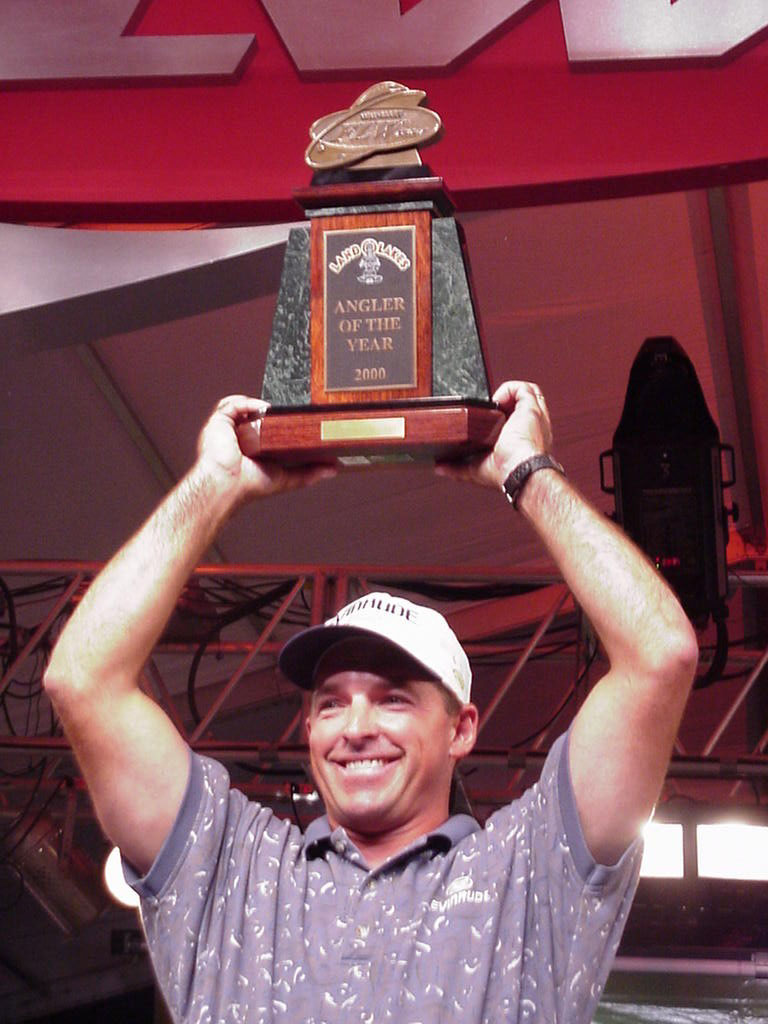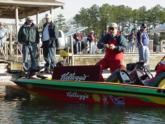All-American launching pad

Some of today’s bass-fishing greats got professional starts with All-American wins
Long before the FLW Tour made $100,000 top prize payouts commonplace in competitive fishing, there was only one event that paid such a huge sum of cash to the winner: the All-American.
Every year since 1984, the Bass Fishing League’s championship event, the All-American, has paid $100,000 to the winner. Some of today’s biggest bass-fishing stars jump-started their professional bass-fishing careers with All-American victories. The top prize bankrolled their first few years on tour, and the media exposure put them on sponsors’ payrolls.
Here is a look at three well-known anglers that launched their fishing professions off the All-American.
1984: Shaw Grigsby
The 1984 All-American will always be remembered as the first FLW Outdoors event to pay $100,000 to a winner. The lucrative event was held on lake Toho in Florida and a young pro named Shaw Grigsby from Gainesville, Fla., had qualified for the field.
That year, Grigsby was the points leader in the Gator Division, and then he grabbed the 12th and final All-American slot at the regional on Lake Eufaula in Alabama.
At the time, the 28-year-old angler was trying to forge a career in professional bass fishing. Grigsby’s father, however, was determined to have Shaw take over the family’s pest-control business.
“I was trying to run a pest-control business to appease my dad and fish full time on the BASS Tour,” Grigsby recalls. “It was a tough time. I was being pulled 20 different directions at once, and I just wanted to fish.”
Before the All-American began, Grigsby not only felt the additional pressure of being the only local in the field, but his wife, Polly, had a surprise for him, too.
“The day before competition started, Polly told me she was pregnant with our first child,” he laughs. “I just thought I was under pressure before that.”
When the All-American starting gun fired on the north end of Lake Toho, Grigsby immediately demonstrated the kind of focus and poise it takes to be a professional angler. He was able to mentally put his pressures aside and concentrate completely on his fishing.
He had two patterns going on the Kissimmee chain. One was a schooling-fish pattern in Toho and the other was a flipping pattern down in Lake Kissimmee.
The schooling pattern went according to plan, and Grigsby led after day one by 2 pounds. But on the morning of day two, the camera crew brought the Florida native some daunting news: second-place angler Bob Hardin of Leesburg, Ga., was having a good morning.
Grigsby had a limit, but they were smaller than his first day’s limit. He knew he had to do something to protect his lead.
“It was pouring rain, and I made a horrendous run all the way down to Kissimmee to try the flipping fish for a few quality bites,” he recounts. “I was flipping thick hyacinth mats, and I can remember being concerned that the fish could not see the bait because of the dark skies and thick mats. So I rigged up one of those old grape worms with the bright pearl curl-tail and began flipping it. I caught a 3-pounder immediately. A few minutes later, I caught a 4-pounder. When I flipped that 4-pounder in the boat, I knew I had the deal sewn up.”
Looking back, Grigsby realizes how much the $100,000 win did for his career. Above all, it provided him an all-expenses-paid bass-fishing education while he endured a few lean years on the BASS Tour.
 “Being from Florida, I had a lot to learn about reservoirs and seasonal patterns across the country,” he says. “That financial backing gave me the freedom to do that – to totally focus on fishing and learn without worrying about where the next check was coming from. Fishing became fun because I could totally immerse myself in it.”
“Being from Florida, I had a lot to learn about reservoirs and seasonal patterns across the country,” he says. “That financial backing gave me the freedom to do that – to totally focus on fishing and learn without worrying about where the next check was coming from. Fishing became fun because I could totally immerse myself in it.”
Grigsby adds that having financial security makes an angler cast for cash with more confidence.
“You really do fish differently with money in the bank,” he says. “Instead of worrying about getting a check, you have more freedom to take risks in tournaments. That win was a huge blessing for me. Before that, the biggest check I had made was $2,000. There is no telling where I would be today without that win.”
1990: Joe Thomas
Joe Thomas of Cincinnati, Ohio, was a 28-year-old professional angler when he competed in the 1990 All-American out of Buffalo, N.Y., on Lake Erie. Thomas had been fishing full time since 1986, and despite making two previous All-Americans and two Bassmaster Classics, he was still living tournament check to tournament check.
“I had proved that I was a consistent fisherman, but what I needed was a national win to solidify my career,” he remembers.
Thomas had qualified for the All-American through the Buckeye Division and the regional on Kentucky Lake. When he headed for Lake Erie, he was full of confidence.
“If I had a strong suit in bass fishing, it was Lake Erie,” he says. “I was raised on Lake Erie, and even though the All-American was putting in on the other side of the lake, it was still the same Lake Erie, and I knew how to fish it.”
Thomas had located some big smallmouths out on the shoals of Sturgeon Point. He was ripping a chartreuse grub off the bottom and letting it fall on slack line to outfish other competitors in the same area. On the first day he brought in 17 pounds, 2 ounces to take the lead by 3 pounds.
“I knew if I could get back on that shoal for just a few hours the next day, I would win it hands down,” Thomas says.
But Mother Nature had a different plan. At dawn on day two, a vicious wind had whipped Erie into an ocean. Tournament officials put the big lake off limits and made the contestants fish within the Niagara River.
“My heart sank with that announcement,” he recalls. “I had never fished inside the Niagara River before, so I had to just go fishing blind.”
Thomas settled on a strategy of fishing marinas on the river with a spinner bait. He caught 6 pounds, 11 ounces, which was enough to hold off a charge from runner-up James Parker of Fayetteville, N.C.
“Given the publicity and amount of money involved with that event, it solidified my fishing existence in the industry and with my sponsors,” he said. “From a credibility standpoint, the exposure I got from winning that event was worth more than the $100,000. I garnered a lot from that win, including my first paying sponsors. It was the first financial security I had in my life.”
His favorite memory of the 1990 All-American was having his mom and dad present to watch him win the event. “They had paid for three years of college when I quit school, so by winning that event, I felt like I had really come through for them. I am glad they got to share in that moment.”
Thomas has not forgotten the feeling of winning the All-American, either. “I have waited 13 years to feel that feeling again. That’s what keeps me fishing.”
1992: Clark Wendlandt
Two-time FLW Tour Angler of the Year Clark Wendlandt is a well-known pro angler these days, but in 1992 he was just another 26-year-old bass angler looking to break into the big leagues.
Wendlandt had struggled with guiding and fishing for several years and was ready to give up the pursuit of full-time bass fishing.
“I was guiding and fishing tournaments – just kind of scraping by,” he reveals. “Patti was in law school and the fishing was just not going all that good. We were married and we wanted to start a family, so I was pretty close to giving up the fishing.”
But things changed when Wendlandt won the BFL Regional on the Columbus Pool of the Tombigbee River and qualified for the All-American. In the regional, Wendlandt won a truck and boat. “I sold the boat, but I drove that prize truck for a long time,” he laughs.
The 1992 All-American was held on the Arkansas River near Muskogee, Okla. Wendlandt chose to avoid the fishing crowds by running up into the Chouteau Pool to a backwater oxbow. On day one he caught about 8 pounds, good enough for eighth place.
He returned to his area on day two and had a much better day flipping shallow cover with a Texas-rigged craw. Meanwhile, the leader from day one, Dennis Griffith of Harrisburg, Ill., had faltered.
“I really don’t remember what happened to his fish,” he says. “I think he was counting on moving, and the water did not run that day. A lot of guys were counting on moving water in that tournament. I was fishing out of the current in an oxbow, so moving water was not necessary for me.”
Wendlandt came from behind to win that All-American with a 15-pound-plus limit on day two. But when he looks back on the event, that big limit does not stand out in his mind as much as a single fish he had caught the day before.
“On the first day, I only had four bass when I locked back down,” he relates. “I had about five minutes to fish, and on a whim, I pulled up to a stretch of bank I had never fished before and caught a 2-pounder. There was something magical about that fish. When I caught it, I was just overcome with this fantastic feeling – like I had somehow won the tournament already.”
Wendlandt won the tournament by just 7 ounces.
Wendlandt’s regional and All-American victories catapulted him into professional fishing. “Those wins gave me the financial confidence to start fishing full time in the fall of 1992, and I have been doing it ever since.”
Where are they now?
The All-American served as a major career kickoff for some of the world’s well-known fishermen like Grigsby, Thomas and Wendlandt. Each has gone on from topping the BFL to see more success in other professional circuits.
Here are some of the highlights from their illustrious careers.
Shaw Grigsby
Grigsby has racked up more than $700,000 cash in BASS tournaments alone, including nine Bassmaster Classic appearances. He has registered an impressive four top-10 finishes along the Wal-Mart FLW Tour since 1997.
Joe Thomas
Thomas has earned more than $250,000 cash in BASS tournaments, including four appearances in the Bassmaster Classic.
Clark Wendlandt
With almost $800,000 in FLW Outdoors career earnings, Wendlandt has been a tour de force on the FLW Tour; he has won three tournaments, including two Wal-Mart Opens at Beaver Lake and one at Lake Murray, and landed in the top 10 a total of 17 times. He is also the only angler to win the FLW Angler of the Year award twice. He did it in 1997 and 2000. Wendlandt has reeled in almost $225,000 cash in BASS tournaments, including four Bassmaster Classic appearances.